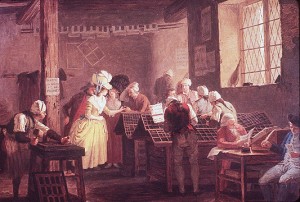The following overview is based on an article in the Encyclopaedia Britannica, 7th edition, 1830, written by J R McCulloch (1789-1864). One could argue that little has changed. Two things remain certain though, whatever the size of the government spending deficit; death and taxes.
Several famous authors have uttered lines to this effect. The first was Daniel Defoe, in The Political History of the Devil, 1726: “Things as certain as death and taxes, can be more firmly believed.” Benjamin Franklin (1706-90) used the form we are currently more familiar with: “‘In this world nothing can be said to be certain, except death and taxes.” Another thought on the theme of death and taxes is Margaret Mitchell’s line from her book Gone With the Wind, 1936: “Death, taxes and childbirth! There’s never any convenient time for any of them.”
Taxation of Income Impracticable
The difficulties in the way of assessing income are of two sorts: Firstly, the difficulty of ascertaining the amount of the annual revenue of different individuals; and, secondly, supposing that amount to be known, the difficulty of laying an equal tax on incomes derived from different sources [1].
It would be useless to dwell at any considerable length on the first. Incomes arising from the rent of land and houses, mortgages, funded property, and such like sources, may be learned with tolerable precision; but it neither has been, and we are bold to say, never will be, possible to determine the incomes of farmers, manufacturers, dealers of all sorts, and professional men, with anything like even the rudest approximation to accuracy [2].
It is in vain to attempt to overcome this insuperable difficulty by instituting an odious inquiry into the affairs of individuals. It is not indeed, very likely that any people, not altogether enslaved, would tolerate, in ordinary circumstances, such inquisitorial proceedings; but whether they did or not, the result would be the same. The investigations would be worthless; and the commissioners of an income tax would in the end have nothing to trust to but the declarations of the parties. Hence it is that the tax would fall with its full weight upon men of integrity, while the ‘millionaire of easy virtue’ would well-nigh escape it altogether [3].
It [Income Tax] would in fact, be a tax on honesty, and a bounty on perjury and fraud, and if carried to any considerable height, that is, to such a height as to render it a prominent source of income, it would undoubtedly generate the most barefaced prostitution of principle, and would do much to obliterate that sense of honour which is the only sure foundation of national probity and virtue. (Encyclopaedia Britannica, 7th edition, 1830)
Notes pertaining to taxation in Britain today
[1] This difficulty has been overcome with Pay as you earn (PAYE) which is a withholding tax in the United Kingdom, and certain other nations. It is an amount collected by employers on behalf of the government from employees as a provisional payment of income (direct) tax on the employee’s earnings.
[2] Self-assessment is the process of tabulating a systematic review of one’s own tax liability, usually for the purpose of settling past tax liabilities as well as predicting future tax liabilities.
[3] Means testing “refers generally to the eligibility for relief for debtors who have sufficient financial means to pay a portion of their debts.” ‘Millionaire of easy virtue’ is a phrase synonymous with ‘benefits cheat’, or ‘tax exile’.
VALUE ADDED TAX (VAT), applies the equivalent of a (indirect)sales tax to every operation that creates value. To give an example, sheet steel is imported by a machine manufacturer. That manufacturer will pay the VAT on the purchase price, remitting that amount to the government. The manufacturer will then transform the steel into a machine, selling the machine for a higher price to a wholesale distributor. The manufacturer will collect the VAT on the higher price, but will remit to the government only the excess related to the “value added” (the price over the cost of the sheet steel). The wholesale distributor will then continue the process, charging the retail distributor the VAT on the entire price to the retailer, but remitting only the amount related to the distribution mark-up to the government. The last VAT amount is paid by the eventual retail customer who cannot recover any of the previously paid VAT. In 1830, it appears the revenue collectors had not perfected the means to levy VAT as such. Such is progress.